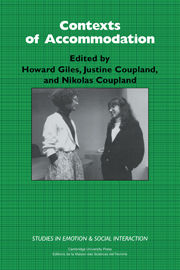
-
Select format
-
- Publisher:
- Cambridge University Press
- Publication date:
- 18 March 2010
- 27 September 1991
- ISBN:
- 9780511663673
- 9780521361514
- 9780521369602
- Dimensions:
- (228 x 152 mm)
- Weight & Pages:
- 0.585kg, 332 Pages
- Dimensions:
- (229 x 152 mm)
- Weight & Pages:
- 0.49kg, 332 Pages
You may already have access via personal or institutional login
Book description
The theory of accommodation is concerned with motivations underlying and consequences arising from ways in which we adapt our language and communication patterns toward others. Since accommodation theory's emergence in the early l970s, it has attracted empirical attention across many disciplines and has been elaborated and expanded many times. In Contexts of Accommodation, accommodation theory is presented as a basis for sociolinguistic explanation, and it is the applied perspective that predominates this edited collection. The book seeks to demonstrate how the core concepts and relationships invoked by accommodation theory are available for addressing altogether pragmatic concerns. Accommodative processes can, for example, facilitate or impede language learners' proficiency in a second language as well as immigrants' acceptance into certain host communities; affect audience ratings and thereby the life of a television program; affect reaction to defendants in court and hence the nature of the judicial outcome; and be an enabling or detrimental force in allowing handicapped people to fulfil their communicative potential. Contexts of Accommodation will appeal to researchers and advanced students in language and communication sciences, as well as to sociolinguists, anthropologists, sociologists and psychologists.
Reviews
"This volume, edited by three of the major researchers in accommodation theory, has much to offer a variety of readers." Karen Adams, American Anthropologist
Contents
Metrics
Altmetric attention score
Full text views
Full text views help Loading metrics...
Loading metrics...
* Views captured on Cambridge Core between #date#. This data will be updated every 24 hours.
Usage data cannot currently be displayed.
Accessibility standard: Unknown
Why this information is here
This section outlines the accessibility features of this content - including support for screen readers, full keyboard navigation and high-contrast display options. This may not be relevant for you.
Accessibility Information
Accessibility compliance for the PDF of this book is currently unknown and may be updated in the future.


